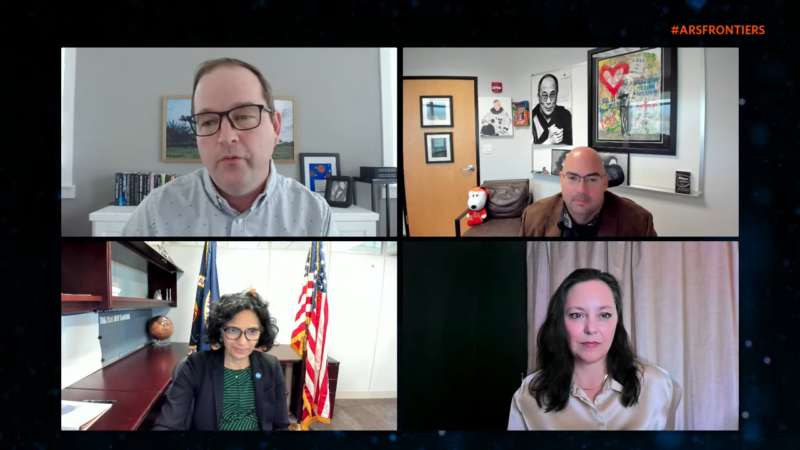
The space industry has seen a dramatic uptick in the number of satellites launched into low-Earth orbit in recent years. Much of this growth, but not all of it, has been driven by the rapid expansion of SpaceX's Starlink megaconstellation, which is now populated by more than 4,000 satellites.
In our space panel for Ars Frontiers, I had the pleasure of discussing the implications of this growth in satellites and space-based services with a distinguished panel of experts. Many issues, good and bad, have arisen, from the cluttering of low-Earth orbit to the development of powerful tools used in conflict, such as synthetic aperture radar and communications in Ukraine. You can watch the entire discussion here.
It's important to realize how much the environment in low-Earth orbit has changed over the last five years. This is the area of space from about 100 km in the atmosphere up to about 2,000 km. But the majority of satellites are clustered within a few hundred kilometers of the surface of the Earth.
Charity Weeden is the vice president of global space policy and government relations for Astroscale, a company working to develop technologies to remove debris from low-Earth orbit.
"Everything has changed in orbit," Weeden explained. "The number of countries in orbit is probably upward of 100 today. So that has really helped the entire global community embrace and utilize space for the benefit of all society. That's a good thing. Space is threaded into our everyday life in our education products, in transportation, communication, as you mentioned, safety, security, economy."
That means we're all in this together, she said, and accordingly, we need to work together. "Over the last six decades, we've been using space as our own personal operating dumping ground. You know, you launch things, things will break up, pieces will remain in orbit, upper-stage rocket bodies will remain in orbit, and they can slowly drift down into the atmosphere as well and burn up on reentry. That's all well and good. But it's the pace of things in the last five to 10 years that has really shown us that the rules that we set up about three decades ago don't apply [and] are not fit for purpose today."
Only four years ago, there were about 2,500 satellites in low-Earth orbit, and there are about 7,000 today. That number will continue to grow as other megaconstellations, including Amazon's Project Kuiper and similar constellations built by China and Europe, come online later this decade. SpaceX also plans to launch more and larger Starlink satellites with its Starship rocket.
There are significant management challenges, for sure, but NASA's Bhavya Lal, the agency's associate administrator for technology, policy, and strategy, struck a hopeful tone.
"I'm not one of those people who likes to kind of do 'the sky is falling,'" she said. "I think this is a manageable problem. We just need to take it seriously. I know you can't predict the future from the past, but in the last 20 years, there's been one instance of an active satellite hitting a piece of trackable debris. We need to figure out how to work with each other to make things better."
One of the biggest issues facing policymakers concerns sharing tracking data for satellites and debris objects in space. This is especially problematic with private companies like SpaceX and nation-states like China, which do not regularly communicate with one another. Privateer Space is trying to help with this issue by creating a data infrastructure to monitor and clean up space debris.
"As nation-states, we must share our tracking data, and we must create standards that are the best for humanity so that we can safely operate in space around the known debris," said Alex Fielding, co-founder and chief executive of Privateer Space. "We also need to start to get a better grasp on the known unknowns, which are the debris smaller than that 10 centimeters on a regular basis, and, ultimately, have persistent tracking and have rules and standards around what's required to put an object in space and how we responsibly manage those objects once they are on orbit."
Reader Comments (72)
View comments on forumLoading comments...